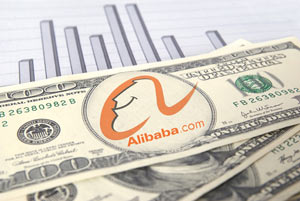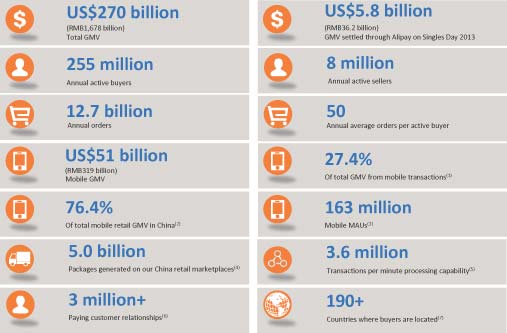Alibaba’s IPO: Risky Business
 The news of the incredibly successful IPO of a relative newcomer to the global market, the Chinese e-commerce giant Alibaba, has rocked the markets from New York to Moscow. The ripple effects of such a large stock exchange bomb may be felt for years to come, and not all of them may be equally positive to all involved…
The news of the incredibly successful IPO of a relative newcomer to the global market, the Chinese e-commerce giant Alibaba, has rocked the markets from New York to Moscow. The ripple effects of such a large stock exchange bomb may be felt for years to come, and not all of them may be equally positive to all involved…

Analysts already predicted that Alibaba’s shares will be a very hot commodity and only warned of the possible risks down the road, when the shares would be directly dependant on the way Alibaba operates and its successes in China and elsewhere. The most commonly held fear before that was that offering such a hugely anticipated stock will suck any purchasing power out of the US stocks market, leading to a downward spiral of being unable to buy any other stocks, effectively halting the trading on the stock exchange. That concern has yet to materialize, though.

In essence, the US stock market was ripe for such a grand IPO. Since 2009, three major IPOs poured a substantial amount of shares already, testing the depth of the investors’ collective pockets. Facebook, Twitter and LinkedIn all vied for the brokers’ attention, and rightly so; the companies added a combined total of over USD 1 trln in just under a year, but market didn’t crash, and stock traders didn’t begin to panic. Another trend did take place instead – shrinking of the public exchange pool of the stock by means of leaving the trading floor. Many S&P 500 index companies were finally cash-rich enough to repurchase their hitherto outstanding shares, withdrawing around USD 2 trln out of the US market between 2009 and now. Other companies simply went out of business, some traded their shares in an unequal stock exchange, some, like Dell, were bought for cash and not via stock. Ned Davis Research Group estimates that the market shrank by almost USD 1 trln in the last four years alone.
This created a perfect storm for Alibaba’s record-breaking outing. Investors were looking to get on board something as lucrative as Amazon or eBay in terms of possible returns. Last decade showed that traditional high performers, the stocks of oil&gas, energy and hi-tech firms, are no longer profitable in the short to medium term. Such shares don’t hold that sexy instant gratification appeal that the modern e-commerce or online start-up companies seem to have in abundance. Enter the Chinese Alibaba group and its explosive IPO — an IPO that disintegrated all the previous stock exchange debut records and set the new ones that will be very hard to top.

It was a very odd IPO by all accounts. To begin with, none of the shares sold under BABA ticker are actually Alibaba’s. They are shares with just economic rights to possible profits and not rights to portions of the company itself. The reason for this is stringent stock exchange policies in mainland China and Hong Kong, where a company has to fulfil a lot of requirements to be traded publicly. Jackie Ma’s Alibaba group didn’t meet these requirements and instead created an offshore company that would become Alibaba’s global proxy. Located in the Cayman Isles, Alibaba incorporated entity was created after AliPay – Alibaba’s online payments service that is one of the groups core businesses – had to move its registration after the licensing checks in 2011.
Normally, Western investors aren’t very comfortable buying or selling promise of returns, which is what they have actually been purchasing since Jackie Ma rang the NYSE trading floor bell on September 19. Faith and fervent enthusiasm alone are what helped balloon this IPO in the first place. BABA shares started off at the higher end of the spectrum, trading at USD 68 per share at the opening session. The share price rocketed to almost a hundred dollars, then slowly bottomed out at around USD 88 a few days later.

At the time, however, the share was valued at a price-earnings ratio of 29, basing on the company’s reported earnings. Valuation of the company was estimated at USD 220 bln. However, the shares were oversubscribed since the get-go, so only the largest investors were able to get in on the act. The lucky first takers purchased more than 320 million shares of BABA stock and earned a rather nice 38% premium. The company itself raised upwards of USD 25 bln, making Jackie Ma instantly the richest man in China. Suffice it to say, the IPO was immense. So immense that a new, grimmer prediction is now a very real possibility.
Analysts all agree that with such an incredibly successful flotation and with so many investors clamouring for a slice of the pie, there’s every indication that the market has just topped out its bull trend of the last few years. It may now be poised to go either way – grow even higher or become bearish, all depending on just how fleeting the moods of Wall Street will become. So far, people seem to like Jackie Ma’s humble and fun personality, and are willing to back their fondness with hard cash… But how long can sheer enthusiasm carry the market?

Market topping out is a growing concern for Donald Luskin, chief investment officer at TrendMacro. He agrees that Alibaba’s success was due to emotional rather than rational trading. „People waited in line to buy Alibaba because they think CEO Jack Ma is the smartest man in the world,” he stated, adding, „The guy you think is the smartest man in the world thinks it’s a good time to sell stocks. And you want to buy? Really?”

The grim possibility of a downward economic trend may spell disaster for other companies that tied themselves to Alibaba’s fortunes. One such company is Yahoo! Incorporated, a struggling US online giant. For a few years now, Yahoo had a 23 percent stake in Alibaba. Owing to their pre-IPO agreement, Yahoo was able to sell a stock of 122 million shares at IPO. After making a mint on that, Yahoo still owns about 15 percent of the outstanding stock, but since they’re in a lock-up deal, they cannot trade them in for a whole year.
But Yahoo! doesn’t just rely on stock exchange performance to get back to its former glory as the leading online search engine and news platform. Nowadays, it’s Yahoo that emulate Google by buying other properties or businesses and adding in a smattering of their own new products where needed. Last year’s USD 1.1 bln purchase of Tumblr (which we wrote about earlier) was recently aided by four new Y!-branded online publications dealing with beauty, health, movies and travel. Clearly Yahoo execs don’t just sit there and count their constantly dwindling cash reserves.

In fact, there’s even wild rumours flying around of possible takeovers; depending on the overall situation of the market, Yahoo can purchase AOL (a company with some recent growth that may help revitalize Yahoo for good) or be purchased itself by… Alibaba, a company they still own a stake in. It may sound odd, but Alibaba is flush with cash since its huge IPO and may do so, especially considering its past trajectory.
Over the past few years, the group has been expanding its business very aggressively, leading some to speculate about its plans to enter the US market as well. One of the signs to look out for may be a recent launch of 11 Main, an online platform that sells top-shelf luxury goods in the US, but it’s not the first time Alibaba’s invested into the US online market indirectly.

In fact, they have been funding online start-ups for a few years already. Just recently, Alibaba group invested large sums in the messaging app Tango (USD 215 mln), bought portion of Lyft (together with another investor pumping in USD 250 mln), poured a pretty penny into the sports memorabilia online store Fanatics (taking part in an investment round of USD 170 mln) and co-financed a videogame start-up Kabam.
Far from limiting itself to the US, Alibaba is making waves globally. In Latin America they’ve partnered up with Brazilian Correios, a state-owned post office service. They have signed deals with some of the European governments to make it easier to sell things via Alibaba’s Tmall platform. And even closer to home, in Asia, Alibaba now owns a USD 250 mln stake in Singapore Post.

Perhaps Jackie Ma wants Alibaba to become a global e-commerce empire, the likes of which would certainly eclipse Amazon, eBay and Paypal put together – which isn’t as far-fetched an idea, what with the size of Alibaba post-IPO. Alibaba is already number 1 in China, and it’s very hard to grow when you’ve outgrown your pond, as Alibaba seems to have.
Let’s just hope that their expansion and the IPO itself don’t become a destabilizing factor for the rest of the global market. With influence on global trade and e-commerce that is hard to deny, Alibaba’s next steps may prove either profitable or disastrous for many across the globe. From the US bullish market that may go bear because of them, to rather risky business of owning their shares only on paper, Alibaba still has to prove to the rest of the world it can actually compete and grow in an interconnected global marketplace without endangering others.
VOCABULARY
IPO (initial public offering) – pierwsza oferta publiczna (akcji spółki na giełdzie)
relative – względny
newcomer – nowicjusz
e-commerce – handel internetowy/online
to rock – wstrząsnąć (czymś)
ripple – krąg (na wodzie), fala
stock exchange – giełda papierów wartościowych
equally – jednakowo
involved – zaangażowany
to predict – przewidzieć
share – udział
commodity – towar
to warn – ostrzec
down the road – w przyszłości, za jakiś czas
dependant on sth – zależny od czegoś
elsewhere – gdzie indziej
commonly – powszechnie, często
anticipated – oczekiwany
stock – akcje, kapitał akcyjny
to suck sth out of sth – wyssać coś z czegoś/skądś
purchasing power – moc nabywcza
downward spiral – opadanie w dół, niekontrolowany upadek
effectively – w gruncie rzeczy
to halt – wstrzymać
concern – obawa
to materialize – urzeczywistnić się
ripe – dojrzały
grand – wielki, ogromny
major – poważny, większy
to pour sth – wlać coś
substantial – pokaźny
pockets – kieszenie, portfel
to vie for sth – ubiegać się o coś
combined total – łączna kwota/suma
to crash – gwałtownie upaść, mieć krach
shrinking – zmniejszanie się
pool – pula
trading floor – parkiet (giełdy)
cash-rich – zasobny w gotówkę
to repurchase sth – odkupić coś
hitherto – dotychczas, do tej pory
outstanding shares – akcje pozostające w obrocie
to withdraw – wycofać, wyjąć
to go out of business – zbankrutować, splajtować
unequal – nierówny, nierównoważny
via – za pośrednictwem
research – badanie, badania
to estimate – szacować
perfect storm – idealny zbieg okoliczności (do tego, aby coś się wydarzyło)
record-breaking – rekordowy
outing – tu: debiut
to get on board sth – wejść do czegoś (do jakiejś spółki/projektu), wziąć udział w czymś (projekcie, przedsięwzięciu)
in terms of sth – pod względem czegoś
returns – zwroty (z inwestycji)
high performer – akcje o wysokiej rentowności/osiągach
profitable – rentowny
in the short term – na krótką metę
instant gratification – natychmiastowe zadowolenie/zysk
appeal – urok, atrakcyjność
modern – współczesny
start-up – młoda spółka
to have sth in abundance – mieć ogrom czegoś, mieć czegoś pod dostatkiem
enter X… – oto (nadszedł/wszedł) X…
explosive – wybuchowy
to disintegrate – zniszczyć, kompletnie zdruzgotać
debut – debiut
to top sth – przebić coś
odd – dziwny
by all accounts – jak by na to nie patrzeć, pod każdym względem
ticker (symbol) – tu: symbol giełdowy, nazwa giełdowa spółki
economic rights – prawa majątkowe
profits – zyski, dochody
portion – kawałek, część
stringent – ostry, surowy
mainland – kontynentalny
to fulfil – wypełnić, spełnić (UK)
requirement – wymóg
offshore – zlokalizowany w raju podatkowym
proxy – pełnomocnik, tu: przedstawicielstwo
incorporated entity – podmiot posiadający osobowość prawną
core – kluczowy, podstawowy
registration – tu: numer spółki w rejestrze (sądowym, hajndlowym)
check – badanie kontrolne
to purchase – nabyć
the NYSE (New York Stock Exchange) – Giełda Nowojorska
faith – wiara
fervent – gorączkowy
to balloon sth – spuchnąć, zwiększyć coś
to start off – wystartować
spectrum – spektrum, zakres
to rocket – gwałtownie wzrosnąć
to bottom out – wypoziomować się
to value sth at X – ocenić wartość czegoś na X
price-earnings ratio – wskaźnik C/Z (cena – zysk)
to base on sth – bazować na czymś, opierać się
earnings – zarobki, dochody
valuation – wycena
oversubscribed – rozdzielony na zbyt wielu chętnych (o akcjach)
since the get-go – od samego początku
to get in on the act – dołączyć do lukratywnego przedsięwzięcia/projektu
first taker – tu: ktoś, kto kupuje pierwszy
premium – tu: zysk z zakupu, wysoki zysk
upwards of X – powyżej X, więcej niż X
instantly – natychmiast
suffice it to say… – dość powiedzieć, że…
immense – ogromny
grim – ponury, czarny
incredibly – niesamowicie
flotation – wejście spółki na giełdę
to clamour for sth – domagać się czegoś, walczyć o coś (UK)
a slice of the pie – kawałek tortu, czyjś udział w czymś lukratywnym/zyskownym
there’s every indication that… – wszystko wskazuje na to, że…
bull trend – trend wzrostowy, zwyżkujący
poised to do sth – gotów, gotowy na coś/do (z)robienia czegoś
bearish – zniżkowy, spadający (trend giełdowy)
fleeting – ulotny
mood – nastrój, humor
humble – skromny
personality – osobowość
willing – skłonny, chętny
to back sth with sth – poprzeć coś czymś
fondness – słabość (do kogoś), uczucie sympatii
sheer – sam, czysty
to carry sth – wytrzymać, udźwignąć
due to – z powodu, przez
to wait in line to do sth – czekać/ustawiać się w kolejce po to, aby coś zrobić
CEO (Chief Executive Officer) – dyrektor naczelny
to state – oświadczyć
to spell sth – zwiastować coś
disaster – katastrofa, nieszczęście
fortunes – losy, dzieje
struggling – borykający się z trudnościami
stake – udział (w czymś)
owing to sth – przez coś, z powodu czegoś
agreement – umowa
to make a mint – zbić majątek
lock-up deal – umowa uniemożliwiająca zbyt akcji
to rely on sth – polegać na czymś
former – dawny, były
glory – chwała
search engine – wyszukiwarka
to emulate sb – naśladować kogoś
properties – tu: przedsiębiorstwa, marki
a smattering of sth – parę/kilka/trochę czegoś
to aid sth – wesprzeć coś
X-branded – o marce X, pod egidą (marki) X
dealing with sth – dotyczący czegoś, zajmujący się czymś
execs (executives) – menadżerowie wyższego szczebla, dyrektorzy
constantly – stale
dwindling – malejący, kurczący się
rumour – plotka
takeover – przejęcie
overall – ogólny
to revitalize – odżywić
to be flush with cash – mieć dużo gotówki, mieć sporo gotówki na zbyciu
considering sth – zważywszy na coś
trajectory – trajektoria, obrana (przez kogoś) droga
to expand – poszerzać działalność, rosnąć
to speculate – domniemywać
to look out for sth – rozglądać się za czymś
launch – wejście na rynek, pojawienie się
top-shelf – z najwyższej półki
luxury – luksusowy
indirectly – pośrednio
messaging – wysyłanie wiadomości
to pump in X – wpompować (w coś) X
a pretty penny – niezły (kawałek) grosza, spory grosz
memorabilia – pamiątki
to take part in sth – brać w czymś udział
investment round – runda inwestycji
to limit oneself to sth – ograniczyć się czymś
to make waves – rozrabiać
to partner up with sb – wejść z kimś w spółkę
state-owned – państwowy
government – rząd
empire – imperium
the likes of sb – ludzie tego pokroju, inni tacy jak ktoś
to eclipse sth – przyćmić coś, zaćmić
X put together – X razem wzięte
far-fetched – naciągany
what with… – zważywszy, że…
to outgrow sth – wyrosnąć z czegoś
destabilizing – zaburzający równowagę, destabilizacyjny
factor – czynnik
influence – wpływ
to deny – zaprzeczyć
to compete – rywalizować, konkurować
interconnected – wzajemnie powiązany, połączony
to endanger – narazić na niebezpieczeństwo, zagrozić
by Prochor Aniszczuk







